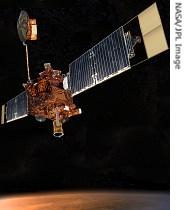-
(单词翻译:双击或拖选)
By David McAlary
Washington
21 November 2006
The U.S. space agency NASA says its oldest satellite orbiting Mars has probably ended its career. NASA engineers lost contact with it about three weeks ago and are losing hope of ever hearing from it again. But NASA is celebrating its accomplishments1 rather than mourning its apparent death.
 |
| Artist's concept of Mars Global Surveyor |
For nine years it pumped out data until November 2, when it emerged from a communications blackout behind Mars and never beamed another signal.
NASA's lead Mars exploration scientist, Michael Meyer, speaks of it reverentially.
"We may have lost a dear old friend and teacher, Mars Global Surveyor," he said. "This mission launched on November 7, 1996 has not only exceeded her design lifetime by five-fold, but it has changed our concept of the red planet."
NASA says the spacecraft may no longer be able to generate enough power to communicate. There are signs that a solar energy panel appears unable to pivot3 easily and track the sun. But engineers are exploring other possible reasons for the radio silence.
They are also trying to detect it through other U.S. craft at Mars. The newest Mars satellite, the Mars Reconnaissance Orbiter, pointed4 its cameras toward the Global Surveyor Monday, but preliminary analysis of the images shows no sightings. NASA is also employing one of its two ground rovers, the Opportunity, to try to listen for a weak signal from the silent satellite.
But the agency's Mars Program Manager, Fuk Li, says the prospects5 for recovery are not good.
"We are still holding out some hope, but we are fully6 prepared in our hearts that we may never be able to talk to the spacecraft again," noted7 Mr. Li. "But we are also fully prepared to celebrate the fact that it has been a job well done."
Mars Global Surveyor has operated longer than any spacecraft ever sent to the red planet. NASA cites many of its important discoveries, several of which point to clear signs that water flowed in the red planet's recent history. The agency plans to send future spacecraft to areas once covered by water in the hope of finding signs of past life.
The Global Surveyor found gullies that appear to have been cut by water in relatively8 modern times. It sensed a mineral called hematite that often forms under wet conditions. It found a fan-shaped area of interweaving, curved ridges9 interpreted as evidence of an ancient river delta10. It showed that Mars' polar ice caps are made of frozen water, not frozen carbon dioxide as previously11 thought.
The satellite also found local magnetic fields, indicating that Mars once had a global magnetic field like Earth's, shielding it from cosmic rays. Because it worked so long, it was able to track environmental changes through many annual cycles.
"Mars Global Surveyor has generated a tremendous legacy12, not only in the discoveries at hand, but also in the future scientific surprises to be discovered from the ongoing13 analyses," added Michael Meyer.
 收听单词发音
收听单词发音
1
accomplishments

|
|
| n.造诣;完成( accomplishment的名词复数 );技能;成绩;成就 | |
参考例句: |
|
|
|
2
terrain

|
|
| n.地面,地形,地图 | |
参考例句: |
|
|
|
3
pivot

|
|
| v.在枢轴上转动;装枢轴,枢轴;adj.枢轴的 | |
参考例句: |
|
|
|
4
pointed

|
|
| adj.尖的,直截了当的 | |
参考例句: |
|
|
|
5
prospects

|
|
| n.希望,前途(恒为复数) | |
参考例句: |
|
|
|
6
fully

|
|
| adv.完全地,全部地,彻底地;充分地 | |
参考例句: |
|
|
|
7
noted

|
|
| adj.著名的,知名的 | |
参考例句: |
|
|
|
8
relatively

|
|
| adv.比较...地,相对地 | |
参考例句: |
|
|
|
9
ridges

|
|
| n.脊( ridge的名词复数 );山脊;脊状突起;大气层的)高压脊 | |
参考例句: |
|
|
|
10
delta

|
|
| n.(流的)角洲 | |
参考例句: |
|
|
|
11
previously

|
|
| adv.以前,先前(地) | |
参考例句: |
|
|
|
12
legacy

|
|
| n.遗产,遗赠;先人(或过去)留下的东西 | |
参考例句: |
|
|
|
13
ongoing

|
|
| adj.进行中的,前进的 | |
参考例句: |
|
|
|















